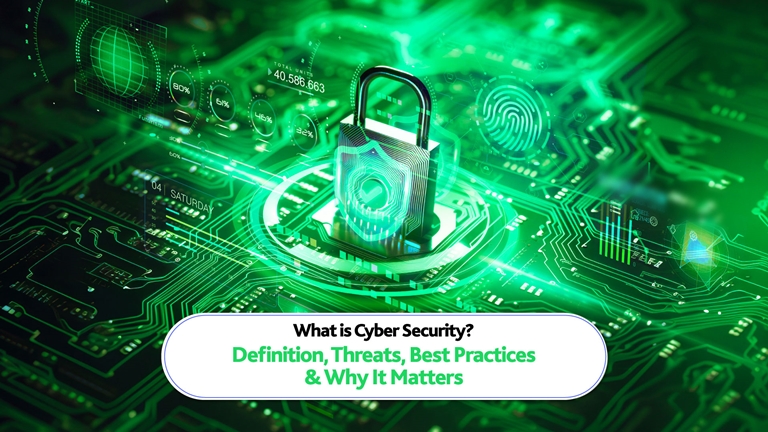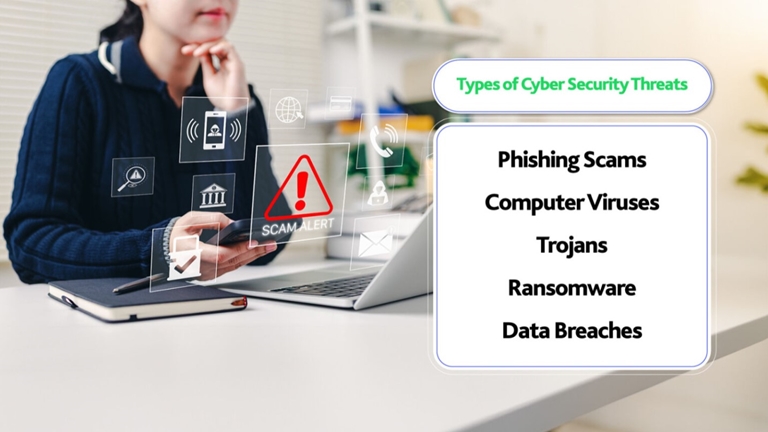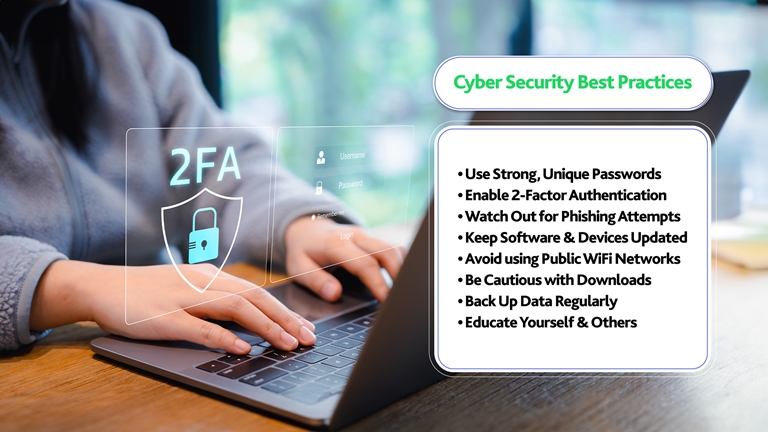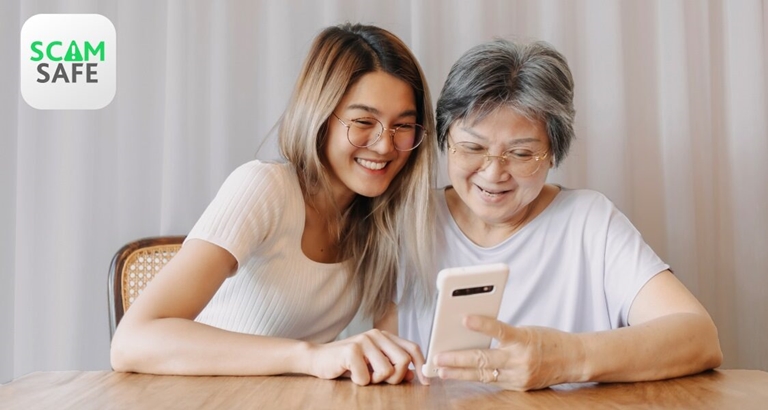What is Cyber Security & Why It Matters: 2025
Cyber security involves protecting your devices, data, servers, and networks from digital threats. Learn why it's crucial to protect yourself, and how!
When we leave for work in the morning, the first thing most of us do is make sure the doors are securely locked.
Cyber security works in pretty much the same way— except that instead of locks, we use things like firewalls, encryption, and proper education to keep our important data safe. Needless to say, this is absolutely crucial in an era where folks are connected to the Internet virtually 24/7.
So today, let’s take a closer look at how cyber security works, what some common threats are, and how we can stay one step ahead of these digital foes.
Quick Navigation
🖥️ What is Cyber Security? (up next!)
🤔 Why is Cyber Security important?
⚠️ Types of Cyber Security Threats
🛠️ Cyber Security Best Practices
🖥️ What is Cyber Security?
Cyber security is the practice of protecting your devices, data, and personal information from digital threats—like hackers, malware, phishing scams, and data breaches.
In other words, if the internet were your home, then cyber security would be your security system, ensuring that while you're online, you’re shielded from pesky cybercriminals trying to sneak in.
Of course, there are also lots of different tools at your disposal. From network-level safeguards to intelligent mobile apps (like our very own ScamSafe), we’ll cover all you need to know to mount a sturdy digital defence.
Types of Cyber Security
Aside from the myriad of different digital threats we face today (more on these later!), did you know that there are various types of cyber security as well? Bringing back that security system analogy from before, each of these layers would be like the locks, alarms and security cameras you might have installed around your home.
- Network Security
Function: Protects internal networks (like your home WiFi) from unauthorised access or misuse.
Example: Firewalls and intrusion detection systems (for office networks) that block suspicious traffic.
- Application Security
Function: Keeps apps secure throughout their development and usage lifecycle.
Example: Regular software updates and patches that fix known vulnerabilities.
- Endpoint Security
Function: Secures individual devices like smartphones, tablets, and laptops.
Example: Antivirus or anti-malware applications that stop suspicious files.
- Data Security
Function: Ensures sensitive information remains protected during storage and transfer.
Example: End-to-end encryption in messaging apps like WhatsApp.
- User Awareness
Function: Empowers users to recognise threats and avoid common scams.
Example: Knowing how to spot a phishing link or brushing up on your cyber security know-how, like reading this article!
🤔 Why is Cyber Security Important?
Now that we know what cyber security entails, it’s time to tackle the elephant in the room: why is cyber security important to us? After all, if we already have plenty of defences for it, is there even a need for us to worry?
In short, cyber security matters because these digital threats are not only constant—they're also becoming increasingly diverse and complex. Modern cybercriminals use sophisticated phishing schemes, ransomware, and AI-driven exploits that can often bypass basic protections, which means that even in a technologically enlightened society like Singapore, we are not immune.
In fact, based on the Singapore Police Force’s Annual Scams and Cybercrime Brief for 2024, there were a total of 55,810 scam and cybercrime cases in the country, a sizable 10.8% increase from 50,376 cases in 2023. Collectively, these led to financial losses of at least S$1.1 billion, up from at least S$651.8 million the previous year, with many of these cases comprising:
- Phone scams where cybercriminals impersonate banks or government agencies
- Phishing links sent via SMS or messaging apps
- Unauthorised data leaks from poorly secured accounts
Once your data is compromised, the consequences can be severe, ranging from heavy financial losses, identity theft, or even compromised access to your online accounts. Here in Singapore, phone scams seem to be particularly prevalent – we have an article covering that if you’d like to learn more.
👉 Learn More: How to Spot, Report & Prevent Scam Calls
👉 Learn More: SPF Annual Scams and Cybercrime Brief 2024
⚠️ Types of Cyber Security Threats
Cyber threats are constantly evolving, and as such, it pays to know as much as you can about them. Here's a closer look at some of the most common digital threats we face today, including definitions and real-world case studies.
🛠️ Cyber Security Best Practices
Protecting yourself from cyber threats doesn’t have to be complicated. Here are some simple yet practical steps you can take today:
1. Use Strong, Unique Passwords
- Create long passwords with a mix of letters, numbers, and symbols.
- Never reuse passwords across different accounts.
- Use a password manager to store and generate secure passwords.
2. Enable Two-Factor Authentication (2FA)
- Adds an extra layer of security by requiring a second verification step (e.g., SMS code, authentication app). Most banking, email, and social media services offer this feature—enable it wherever possible.
3. Watch Out for Phishing Attempts
- Don’t click on suspicious links in emails, texts, or social media messages.
- Always verify the sender before providing personal or financial information.
- Many scam links include typos, grammatical errors, or slight variations in domain names (e.g., "faceb00k.com" instead of "facebook.com").
4. Keep Your Software & Devices Updated
- Many cyber-attacks exploit outdated software with known vulnerabilities, so be sure to install updates for your operating system, apps, and security software regularly.
- Picking up additional protection like CyberProtect can also be a big help.
👉Learn More: CyberProtect
5. Avoid Using Public WiFi Without a VPN
- Public Wi-Fi networks are prime targets for hackers who can intercept your data.
- Use a Virtual Private Network (VPN) to encrypt your internet traffic and protect your privacy.
6. Be Cautious with Downloads & Attachments
- Only download software from trusted sources (e.g., official websites, app stores).
- Avoid opening attachments or clicking links in unexpected emails.
7. Back Up Your Data Regularly
- Store important files in secure cloud storage or even an external hard drive. In the case of a ransomware attack, having a backup means you won’t lose everything.
8. Educate Yourself & Others
- Stay informed about the latest cyber threats and scams.
- Teach family members (especially kids and elderly relatives) about online dos and don’ts.
🛡️Defend against Scams with ScamSafe!
Designed in collaboration with TrustTech provider Gogolook, ScamSafe is StarHub’s very own anti-scam mobile app that anyone can download and use. Featuring a multitude of helpful features, from call and SMS filters to scam databases and even reporting channels, it’s truly an amazing tool to have in your corner. Here’s a sneak peek of what it can do:
✅ Call and SMS Filters
Did you know that simply having ScamSafe set up on your phone automatically protects you from the bulk of suspicious messages and calls?
That’s right. Among the app’s many nifty features are a set of scam call and SMS filters, which can swiftly detect any such calls and texts and send them straight to the digital trash heap. What’s more, this is all done 24/7 without you needing to lift a finger, leaving you free to spend time on other pursuits.
On top of this round-the-clock monitoring, you can even set up some extra layers of security using the app’s custom keyword filters. These can be configured to target common scam-associated phrases such as “urgent payment,” or “lucky draw”, making it absolutely perfect for vulnerable demographics like children or the elderly.
🔄 Updated Scam Database
How does ScamSafe know what messages and texts are potentially scams? Well, it’s equipped with an extensive (and regularly updated!) database of registered scam numbers, which subscribers can also contribute to by making simple in-app reports. This database even comes with an in-built number lookup, making it easier than ever to identify dodgy callers.
Want to take ScamSafe for a spin? We’re giving everyone a 6-month free trial! Existing StarHub subscribers can subscribe to it conveniently via the StarHub App, while non-subscribers can download it via the App Store and Google Play Store respectively.
After the free trial window, subscriptions will be priced at $2.99/mth for StarHub subscribers and $4.99/mth for non-subscribers.
🌟Stay Cyber-safe with StarHub!
In summary, cyber security isn’t just a buzzword for big businesses or tech experts to worry about—it’s for all of us. The rise in scams, phishing attempts, and digital deception means that our everyday activities are now part of the battleground.
That’s why it’s important to know exactly what we’re up against and what tools we have available to deal with them. Here at StarHub, we’re committed to helping our users do just that with handy products like ScamSafe.
Indeed, we want to do more than just keep you connected – we want to ensure that you and your loved ones stay cyber-secure every step of the way!
📖 Additional Help & Resources
There are lots of helpful and reputable cyber security resources available to us here on the little red dot.
Whether you need reports on the latest cybercrime trends in Singapore, additional tips on staying safe online, or if you just want to learn more about modern cyber threats, feel free to check these out.
1. Cyber Security Agency of Singapore (CSA)
The CSA is the primary agency responsible for strengthening Singapore's cyber security posture. In addition to organising cyber security forums and initiatives, the agency also offers a wealth of information on national cyber security strategies for both individuals and businesses alike.
👉 Learn More: Cyber Security Agency of Singapore
2. Infocomm Media Development Authority (IMDA)
The IMDA plays a crucial role in driving Singapore's digital transformation, providing detailed regulatory and licensing information alongside vulnerability reporting protocols for cyber security. Their reports also offer valuable insights into Singapore’s previous brushes with ransomware and other types of cyber-attacks.
👉 Learn More: Infocomm Media Development Authority
3. Singapore Police Force (SPF)
The SPF website offers lots of general information on the latest cybercrime trends, safety tips, and public guidelines on reporting cyber incidents. Additionally, if you feel you have been scammed, the best step forward is to make a Police Report – this can be done online via the SPF e-Services portal or in-person at your local Neighbourhood Police Post.
👉 Learn More: Singapore Police Force
👉 Learn More: SPF e-Services Portal (if you need to file an official Police Report)
This article was last updated on 27 May 2025.


 Back
Back





